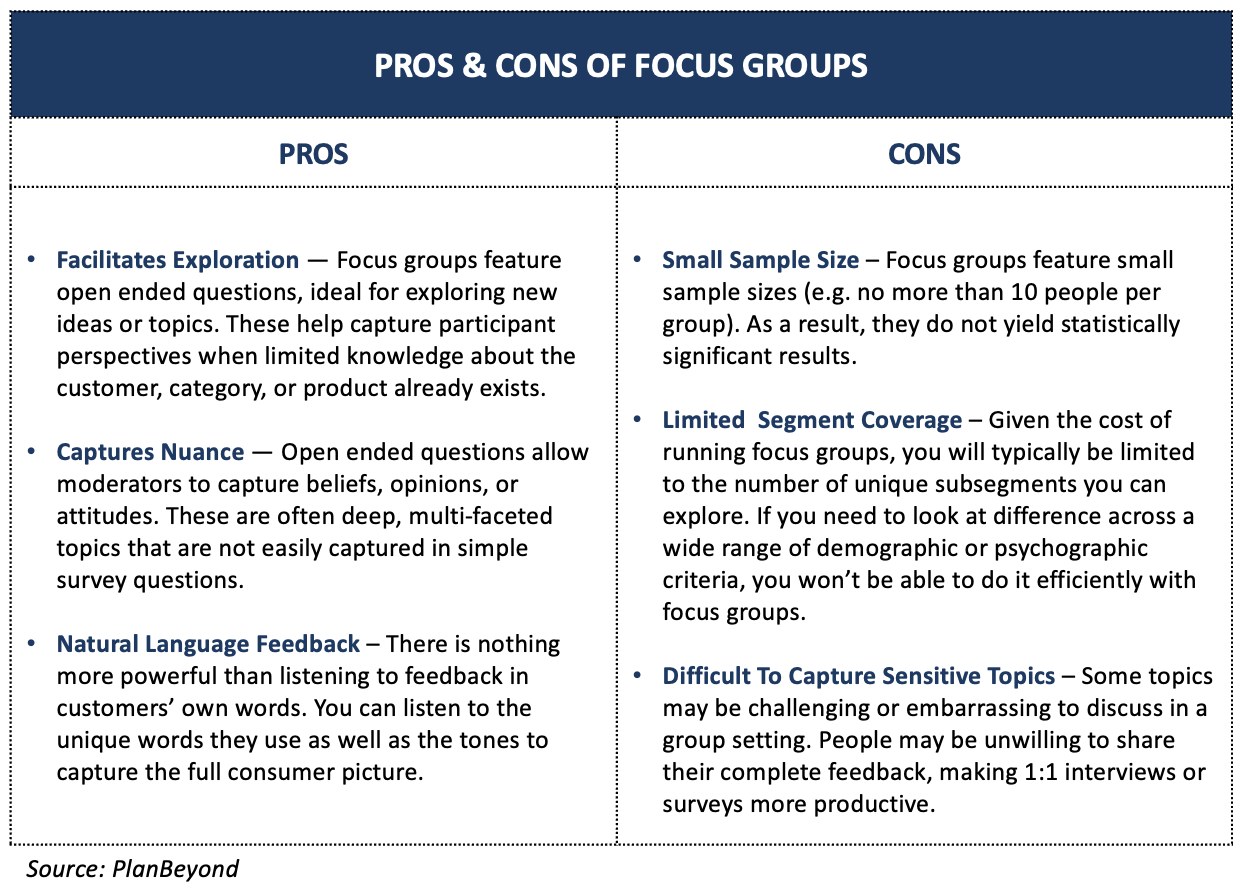Are you considering running a focus group? They are a fantastic market research method that helps organizations explore new customers, markets, or product ideas.
However, as with any research method, they are not a one-stop shop. The very thing that makes focus groups unique also drives their limitations. Let’s look at what defines this research approach to understand the full pros and cons of focus groups.
What Is A Focus Group
A focus group is a guided conversation with a small group of individuals, managed by a dedicated moderator.
There are a few components that make a focus group truly a focus group, and not just a group discussion.
- Learning Objectives: Focus groups should start with upfront learning objectives. These are the key areas an organization wants to understand as a result of running the research. If you have particular hypotheses you want to explore, this is where they come in.
- Discussion Guide: Once we know a focus group’s learning objectives, we develop its discussion guide. Essentially, this includes all of the questions we want to ask during each focus group. And, as you can image, the questions tie back to the learning objectives. By following a structured guide, focus groups let us ask the same questions of different groups. This lets us identify consistent patterns across groups or isolate how unique segments differ from each other.
- Experienced Moderator: A focus group comes with (usually) one experienced conversation facilitator. This individual has multiple roles. First, they manage the conversation and the discussion guide in the time allotted for the group. While doing this, they focus on gathering feedback from all participants. That means managing the heavy talkers while engaging with quieter participants.
Now that we see what makes up this research method, we can identify the inherent pros and cons of focus groups themselves.
The Pros & Cons of Focus Groups
Let’s be clear. We absolutely love focus groups, and regularly use them with our clients. Nevertheless, they aren’t perfect. Let’s break down when to use them…and when not to.
The Pros Of Focus Groups
The conversational nature of focus groups result in some of the strongest reasons to use this research method. This includes:
Exploring New Areas
When you don’t know what you don’t know, focus groups are a great way to start learning. Using open-ended questions to gather respondent feedback allows organizations to explore new consumer, market, and customer areas. Additionally, it helps develop hypotheses for future research validation.
Capturing Nuance
Once again, the open ended nature of focus group questions yields another benefit: the ability to capture beliefs, opinions, or attitudes in nuanced ways. These are often deep, multi-faceted topics that are not easily understood via simple survey questions.
Natural Language Feedback
There are few things more powerful than hearing feedback in a person’s own words. Focus groups let you do just that. Fielding focus groups lets organizations listen to not just the unique words customers use but also the tone and context. The result is a full, robust picture of the topic being explored.
The Cons Of Focus Groups
On the flip side, it’s the nature of focus group design that also results in their downsides.
Small Sample Size
Compared to surveys, focus groups feature small sample sizes. For instance, a typical offline focus group includes 8-10 people. Meanwhile, a typical digital focus group includes 4-5 people. As a result, you cannot collect statistically significant data from focus groups alone.
Limited Segment Coverage
Given the cost of running focus groups, you can only recruit so many different types of people. This means there are only so many sub-segments within your population that you will be able to explore. If you need to look at difference across a wide array of demographic or psychographic criteria, you won’t be able to do it efficiently with focus groups.
Difficult To Capture Sensitive Topics
Because focus groups are group discussions, they are not ideal for sensitive or embarrassing topics. Participants may be unwilling to share candid, honest feedback in this type of setting. As a result, 1:1 interviews or survey based research are often better approaches.







